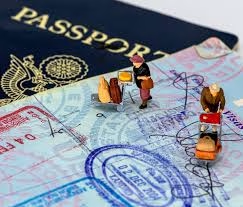
Visa Options, Advantages, and Ugly Truths: Step-by-Step Travel Guide to Canada from Nigeria
step-by-step travel Guide to Canada from Nigeria is what some nigerian want with enough clearity, Ask any Nigerian youth what their dream is, and chances are you’ll hear one word: “Canada.” It has become a symbol of hope, freedom, and opportunity the “Promised Land” for those fed up with bad governance, unemployment, and endless “sufferhead” back home.
But before you start screaming “Japa!”, you need to know that moving to Canada is not a walk in the park. In fact, the journey is filled with paperwork, scams, emotional rollercoasters, and financial pressure that could ruin you before you even get there.
This article provides a step-by-step travel Guide to Canada from Nigeria, breaking down the available visa options, their advantages, disadvantages, and the controversial realities the travel agents won’t tell you.

Step-by-Step: How to Start Your Canada Journey from Nigeria
Let’s break it down in real-world, Nigerian-friendly terms:
Step 1: Decide Your Purpose
Canada is not a one-size-fits-all destination. You need to know:
- Are you going to study?
- Do you want to work?
- Are you aiming for permanent residency (PR)?
- Or are you just testing the waters with a visit?
Your purpose determines the type of visa you need, your documents, and your timeline.
ALSO READ
Top 5 Countries for Nigerian Hustlers
Benue State Launches Quick Response Squad to fight Insecurity
Enugu Makes History as First to Own an Airline A.K.A Enugu Air
Step 2: Check Your Eligibility
Each visa stream has specific requirements:
- Educational credentials
- Work experience
- IELTS language test
- Proof of funds
- Police clearance & medicals
Failure to meet these will automatically kill your application, no matter how much you paid your agent.
Step 3: Prepare Documents and Apply Online
Most Canadian visa applications are processed through the official IRCC portal. You’ll need to:
- Create an account
- Fill out the right forms
- Upload documents (passport, bank statements, letter of acceptance/job offer)
- Pay your application fee
Beware of scammers! No real Canadian visa requires you to “pay into a personal account” in Nigeria.
Step 4: Biometrics & Visa Interview (if applicable)
Once your documents are accepted:
- You’ll be asked to do biometrics (fingerprints/photo) at a visa center (Lagos or Abuja)
- Some streams may require interviews or additional documentation
Step 5: Wait… and Wait Some More
Canadian visa processing is infamously slow and often biased against Nigerians.
While the official processing time is 4–12 weeks, many Nigerians wait 6 months to 1 year for a decision.
Some get refused for vague reasons like “travel history” or “insufficient ties to home country.”
Available Canada Visa Options: Pros, Cons & Brutal Truths
Let’s now dive into the major visa types Nigerians can apply for including the advantages, disadvantages, and controversial truths the embassy won’t put on their website.
1. Study Visa (Student Visa)
Pros:
- Easiest path to Permanent Residency
- Allows you to work 20 hrs/week during school and full-time during holidays
- Your spouse can come with a work permit
- Children get free education
Cons:
- Costly: Tuition can range from ₦7M–₦15M/year + ₦5M proof of funds
- Requires IELTS (even for Master’s students)
- Working while studying is not enough to survive without external support
- Many drop out and start hustling in warehouses
Brutal Truth:”You won’t go to class and become rich. That ‘school is the easiest way to Canada’ lie has left many broke and depressed.”
2. Caregiver & Health Worker Visa
Pros:
- High demand in Canada (especially post-COVID)
- Often no degree needed
- After 24 months of work, you may qualify for PR
- Some employers sponsor your relocation
Cons:
- Job is physically & emotionally exhausting
- Some agents exploit applicants by demanding ₦3M–₦5M “processing fees”
- Abuse by employers is rampant, especially in private homes
- Wages may barely cover bills
Brutal Truth:
“Nigerian caregivers are working like modern slaves in a ‘white savior’ system. You’re respected more in Nigeria as a hairdresser than in Canada as a care worker.”
3. Work Permit (LMIA-based jobs)
Pros:
- Direct job offer from a Canadian employer
- Allows spouse & dependents to join you
- Easy PR pathway if employer is legit
- High-demand fields include IT, truck driving, engineering
Cons:
- Requires Labour Market Impact Assessment (LMIA), which is hard to get
- Fake agents sell “job offers” for ₦7M–₦15M complete scams
- Visa denial rate is high if you don’t meet strict requirements
Brutal Truth:
“Unless you’re highly skilled or extremely lucky, a work permit is harder than NEPA bringing light during rain.”
4. Visitor Visa (Tourist/Family Visit)
Pros:
- Cheaper and faster to get than other visa types
- Ideal for short trips, conferences, or family events
- Can be a stepping stone to other visa types
Cons:
- Zero chance of working legally
- Highly scrutinized for intent to overstay
- If you overstay, you’ll be banned for years
Brutal Truth:
“Some people use visitor visas to enter and disappear into underground jobs. It works — until you get caught, arrested, and deported like a thief.”
5. Express Entry (Skilled Immigration)
Pros:
- Direct path to Permanent Residency
- Points-based system rewards skills, education, age
- You can live and work anywhere in Canada from day one
Cons:
- Requires IELTS, ECA (degree verification), and proof of funds
- Points system favors younger people with work experience and high English test scores
- Very competitive – over 200,000 applicants from across the world
Brutal Truth:
“Nigerians with PhDs and 8 years of experience are still getting rejected. If your CRS score is below 470, forget it for now.”
Let’s Talk Money: What Does It Really Cost?
| Visa Type | Approx. Cost (₦) | Other Expenses |
|---|---|---|
| Student Visa | ₦7M–₦15M | Tuition, visa fee, proof of funds |
| Caregiver Visa | ₦2M–₦5M (agent fee) | Medicals, training, travel |
| Work Permit | ₦5M–₦10M | LMIA, job offer, visa |
| Visitor Visa | ₦300K–₦600K | Flight, accommodation |
| Express Entry | ₦3M–₦5M | IELTS, ECA, proof of funds |
NOTE: These are estimates. Always verify with official sources and avoid shady agents.
Red Flags to Watch Out For
- Agents who guarantee visa approval – No one can.
- “Pay N3M for caregiver job” ads – Often scams.
- No contract/job letter – You’ll be deported at the airport.
- Fake schools or colleges – Many Nigerians have lost millions.
Real Talk: Why Many Nigerians Still Fail at the Canadian Dream
Even after getting to Canada, many Nigerians still face:
- Racism in housing and employment
- Depression and isolation (especially in rural provinces)
- Culture shock and stress
- Financial pressure from home to “show results”
Some end up worse off than they were in Nigeria.
Some turn to fraud. Others quietly return home.
“We came to look for greener pastures but found emotional drought,” said Chika, a student in Nova Scotia.
Final Tips for Naija Hustlers Eyeing Canada
Do your research – Use official Canadian government websites only.
Get a real skill – IT, nursing, accounting, or trade work increases your chances.
Don’t borrow to impress visa officers – Fake bank statements can kill your dream.
Mental health is key – The Japa life is not always rosy.
Plan your exit strategy – Don’t just escape Nigeria; have a long-term goal.
WhatsnextNG Conclusion: Canada Is Not for the Lazy or the Naive
Yes, Canada has opportunities. Yes, people are living better lives. But don’t let motivational Instagram posts deceive you. Behind every smiling picture is a story of hustle, heartbreak, and healing.
So, if you’re going to Japa, do it smartly with your eyes open and your documents solid.
Because in this journey, hope is not a strategy. Planning is.




